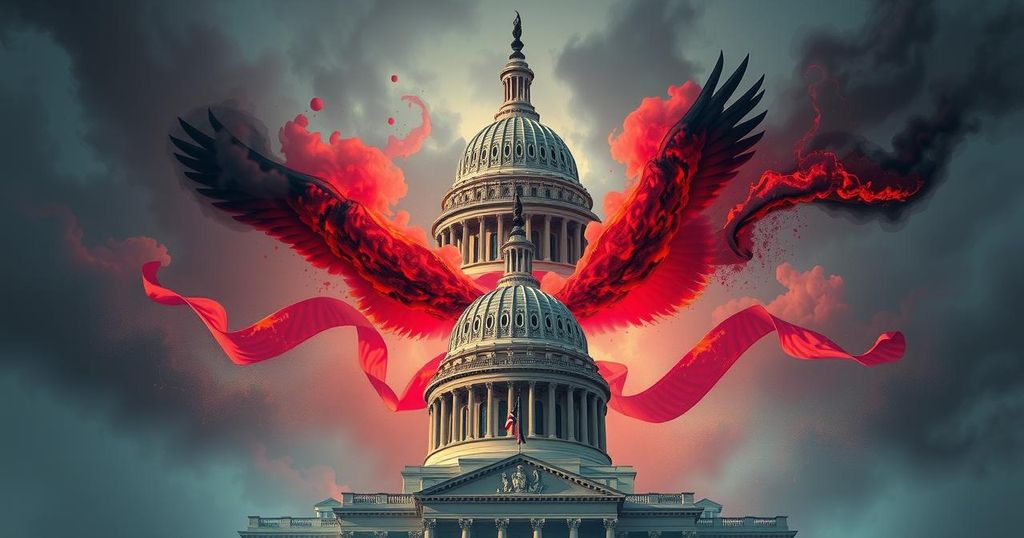157 Election Deniers Persist in Congress Four Years After January 6 Insurrection

Four years post-January 6th insurrection, 157 election deniers remain in Congress, highlighting the trivialization of the election denier label. Trump’s impending return to the White House showcases the enduring loyalty within the GOP, where significant numbers of members continue to deny the 2020 election results. This situation starkly contrasts with the decisive actions taken on similar issues in Brazil and South Korea, where political figures have faced immediate accountability. The slow response from the U.S. Justice Department further underscores the normalization of disinformation in American politics, permitting the continued influence of election denial.
The enduring presence of 157 election deniers in the newly established 119th Congress sharply illustrates the relative political triviality of the election denier label four years post the January 6th insurrection. Despite the attempt by supporters of Donald Trump to disrupt the certification of Joe Biden’s victory after the Capitol riots, Trump remains politically unscathed and is preparing for a return to the White House. With a membership of 137 House members and 20 Senators affirming election denial, the Republican Party persists in sowing doubt regarding the legitimacy of the 2020 election results, demonstrating a significant level of complicity and adherence to disinformation within the political framework. Additionally, 10 of the 27 Republican governors nationwide, along with a notable number of state attorneys general and secretaries of state, maintain a stance of election denial, evidencing a lack of political consequences for these actions.
In stark contrast, other democratic nations such as Brazil and South Korea have taken decisive actions against political figures and movements that sought to undermine democratic processes. South Korea’s National Assembly swiftly moved to impeach President Yoon Suk Yeol following martial law declarations, while Brazil responded to an attempted coup after the 2022 election by arresting key officials and barring former President Jair Bolsonaro from seeking office until 2030. These instances highlight a direct and immediate accountability for violations of democratic norms, unlike the slower, more methodical approach taken in the United States.
In the aftermath of the January 6th riot, the response from U.S. political leaders has been markedly less aggressive. Important legislative efforts aimed at investigating those who sought to overturn the election stalled, with key figures in Congress showing little urgency towards accountability. While over 900 individuals have faced charges related to the riots, efforts to directly address the involvement of political leaders in instigating the violence have faltered, contributing to a cultural normalization of election denial within American politics.
The cautious approach of the Justice Department, led by Attorney General Merrick Garland, which focused initially on prosecuting individual rioters rather than examining the broader culpability of influential political actors, has drawn criticism. Consequently, Trump and his associates have not faced the full extent of accountability for their roles in the events surrounding January 6th. The absence of significant repercussions has led to the continued presence of election deniers in Congress, currently numbering 157, underscoring a troubling assimilation of election denial into the normal functioning of American governance.
This article examines the political landscape four years after the January 6th insurrection, emphasizing the continued presence of election deniers in Congress and the lack of severe political repercussions for those who challenged the legitimacy of the 2020 presidential election. With Donald Trump poised for a return to power and a significant number of Republican members of Congress expressing support for election denial, the article contrasts this situation with the more decisive actions taken in other democracies, such as Brazil and South Korea, following similar threats to their governmental integrity. The critique extends to the U.S. Justice Department’s approach to handling accountability for the insurrection and the failure to execute timely investigations into the actions of political figures involved in undermining election results.
In conclusion, the persistence of 157 election deniers in Congress emphasizes a troubling trend in American politics where disinformation is normalized, reducing the significance of accountability measures. The comparative analysis with swift actions taken in Brazil and South Korea highlights a failure within the U.S. political system to uphold democratic norms effectively. The slow, often reluctant response to hold those accountable for inciting insurrection has not only failed to deter individuals from expressing disinformation but also further embedded such ideologies within the fabric of U.S. governance. This phenomenon reveals a critical need for reassessment of the mechanisms by which accountability is enforced in American democracy.
Original Source: zeteo.com







